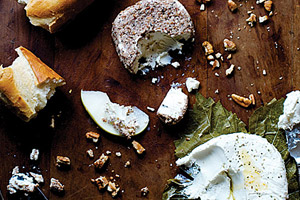
|
Artisan. It’s a beautiful word, one that conjures up green pastures, vineyards on Tuscan hills and weathered hands shaping cheese.
As it has grown in popularity, several American cheesemakers, crafters of jam, beekeepers, butchers and other craftsmen have adopted the term. It has become synonymous with quality, care and the good old-fashioned human touch. Purchasing an artisan product, while often more expensive, is something that gives us both tangible and intangible benefits: from better food to better feelings.
But something curious has happened recently. Large corporations have begun to use the term to describe their industrially manufactured products. Dunkin’ Donuts called its bagel line artisan, and was met with outcries from local bakeries in New York. Domino’s has launched a line of pizzas that it labels artisan. When faced with backlash from within the industry, media and consumers, they admitted to using the word artisan “with a wink and a smile.”
For us at Belle Chevre, artisan is a very real term. We handcraft our cheese. Literally every bite you have, whether it is of our classic log or our honey breakfast cheese, has passed through the hands of our talented cheesemakers. I personally believe this truly sets us apart from the larger goat cheese producers.
Think of it: your log has received individual attention from an expert at every step of the process. Each piece is unique and alive. The grass the goats eat, the time of year they eat it, the weather and other factors contribute to the characteristics of a living, breathing product. Industrialization brought us consistency at the cost of character.
Should you stop into our tiny creamery in Elkmont, Ala., you will find happy music playing, cheesemakers joking and singing, and real people crafting a delicious product. That’s artisan. Artisan is not frozen products being prepared at the moment by someone who couldn’t name half of the ingredients. You will see our cheesemakers tasting at every step of the way, ensuring the level of quality that we demand. That’s artisan.
The only question now is: Where do true artisans go from here? Will the public be able to see through the appropriation of the term “artisan” and separate the real from the fake? There has been coverage in the media on this theme, including an article in Time magazine (“The ‘Artisan’ Hoax: Has That Word Become Meaningless?”) Is that enough to put out the flame before it does any damage?
Perhaps there will be a new vocabulary that is more specific that we can use to distinguish handmade, small-batch goods from industrial ones. I think most artisans would agree that another government sanction or title is not the way to go. Although it would help separate artisans from non-artisans, it would create a whole host of new problems.
It’s a worthy question. How do we, in this increasingly rapid and digital age, market our slow, old-fashioned ways? This is a point that would do well to be debated between leaders in the dairy industry. If larger corporations have thousands to throw behind market studies and commandeer terminology for their benefit, what do smaller producers have? We have heart, we have authenticity and we have each other.
I believe one answer is education. Teach consumers what makes a handmade, artisan cheese different than orange mass-produced cheese slices. This can be achieved one on one, through media coverage, and via our social networks. With education, one would hope that consumers can make a choice that speaks to the value of true artisans.
Dairy Foods seeks essays from dairy processors. Contact carperj@dairyfoods.com.


Recent Comments
Discount code
Alex Shimray
Thank you for sharing this! This is really...
Thank you for sharing this! This is really...
yes, nowadays more teenagers like to have a...